London Again
28 May
Within a week I was back down in London again.
Ross and I had planned this trip at the
back end of last year, well before I got to hear about the possibility of the
Quaker training course I went on last week.
It was all organised to tie up to two artistic events
- Daniel Radcliffe's West End debut in Peter Shaffer's Equus
- English National Opera's performances of Benjamin Britten's Death in Venice
I was interested in seeing Equus to compare and contrast it with my
experience of seeing when it was first produced back in the 70s when I was a
student at University College London.
I was interested in seeing Death in Venice again after nearly twenty years
and having seen the world premier production with Peter Pears in the title rôle
at the Edinburgh Festival back in 1973.
I think that Ross was more interested in seeing Equus for the chance to see
young Dan's willy and I suspect that he was going to the Britten out of a sense of
duty to accompany me and because I keep telling him how good Britten is.
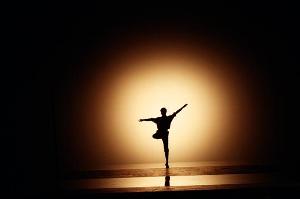 In the event, I was not all that taken with the Death in Venice. Tom Pye's
design with Jean Kalman's lighting was visually very beautiful and Deborah Warner's
direction was very serious. But I think that their creation was completely wrong in
two vital respects. Firstly, it took a strong line that the piece is about the
difficulties of being continually creative and not at all about homoeroticism. That
may be true of Thomas Mann's novella but Britten's work, whether he liked it or not,
is built on the premise of an older man's infatuation with a beautiful young boy.
In the event, I was not all that taken with the Death in Venice. Tom Pye's
design with Jean Kalman's lighting was visually very beautiful and Deborah Warner's
direction was very serious. But I think that their creation was completely wrong in
two vital respects. Firstly, it took a strong line that the piece is about the
difficulties of being continually creative and not at all about homoeroticism. That
may be true of Thomas Mann's novella but Britten's work, whether he liked it or not,
is built on the premise of an older man's infatuation with a beautiful young boy.
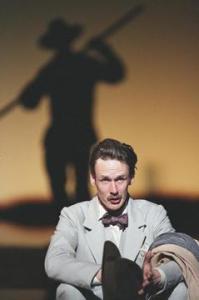 And that brings me to the second problem - Ian Bostridge's assumption of the title
rôle of Gustav von Aschenbach. He is simply too young. Superbly acted though
the physical descent into death by cholera is; superbly sung though the acres of
exalted recitative are; superbly characterised though the whole performance is, there
is no disguising the fact that Ian Bostridge is a man in early middle age enacting
the torments of a man in late middle age and he lacks the gravitas to carry the
project off.
And that brings me to the second problem - Ian Bostridge's assumption of the title
rôle of Gustav von Aschenbach. He is simply too young. Superbly acted though
the physical descent into death by cholera is; superbly sung though the acres of
exalted recitative are; superbly characterised though the whole performance is, there
is no disguising the fact that Ian Bostridge is a man in early middle age enacting
the torments of a man in late middle age and he lacks the gravitas to carry the
project off.
There is a third thing. Bostridge is phenomenally good as a lieder singer and so
I remember all of those soliloquies much more through his performance. And therein
lies a problem. And it is with the work itself. Take away the semi-sublimated
eroticism; turn away from the lyric aspects of the piece; focus on the intellectual
content and suddenly it becomes very cramped and arid.
Elsewhere, Peter Coleman-Wright was excellent in the various guises of the Voice of
Dionysus. I liked Iestyn Davies's bright counter tenor as the Voice of Apollo.
Kim Brandstrup's choreography was effective and Benjamin Paul Griffiths looked well
as Tadzio. Conductor Edward Gardner starts next year as Music Director of this
company. I wish him well. Three stars.
![[Three Stars - Good]](3.gif)
A couple of years ago, I realised that I had managed to see
all of Puccini's mature operas in the space of
a decade. With this show, I have seen the majority of Britten's mature operas.
Wild horses will not get me to see The Rape of Lucretia again and I can't
see any reason for travelling to see Owen Wingrave. So, for me, this is as
full as the list is likely to get.
Come Friday morning, we walked down Southampton Row in the direction of the South Bank Arts
Complex and, in particular, in the direction of the Hayward Gallery. We were drawn by a new
exhibition of works by Antony Gormley, who is responsible for
Another Place on Crosby beach. In previous
times, we've also seen his Field at Tate Liverpool
and a show of his drawings at the British Museum.
 We encountered one of the statues on Waterloo Bridge. We knew from advance publicity that
this was part of the exhibition and belonged to a work called Event Horizon which
placed statues on top of buildings within sight of the Hayward. To us, it felt like a
renegade from Another Place.
We encountered one of the statues on Waterloo Bridge. We knew from advance publicity that
this was part of the exhibition and belonged to a work called Event Horizon which
placed statues on top of buildings within sight of the Hayward. To us, it felt like a
renegade from Another Place.
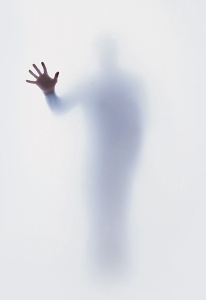 The show is called Blind Light and the centre piece is an installation filled with
vapour so that you cannot see more than six inches in front of you. It was a strange
experience living in a total white out in a gallery in London. After a while I got
used to working out where I was by creating splashing sounds in the water on the floor.
It was a bit like being a bat. The vapour did wonders for my sinuses as well.
The show is called Blind Light and the centre piece is an installation filled with
vapour so that you cannot see more than six inches in front of you. It was a strange
experience living in a total white out in a gallery in London. After a while I got
used to working out where I was by creating splashing sounds in the water on the floor.
It was a bit like being a bat. The vapour did wonders for my sinuses as well.

 The whole show was full of simple visual joy such as this. For example, I also liked
Allotment which comprises a room full of what appear at first sight to be serried
ranks of concrete boxes. It turns out that these are all individual and have been derived
from the shape, size and weight of a groups of villagers. In time, the room becomes
a crown of people. I walked among them and got to know them.
The whole show was full of simple visual joy such as this. For example, I also liked
Allotment which comprises a room full of what appear at first sight to be serried
ranks of concrete boxes. It turns out that these are all individual and have been derived
from the shape, size and weight of a groups of villagers. In time, the room becomes
a crown of people. I walked among them and got to know them.
 Elsewhere in the gallery were groups of strange extruded shapes which had in their kernel
a human form that was then extruded into great star bursts of wire. Elsewhere in the
gallery were rooms with human shapes sitting in each of the eight corners legs splayed
and arms raised so that their limbs follows the creases of the room. Then there was
Event Horizon best seen from the terraces of the Hayward Gallery. Where the
figures in Another Place are all looking away and out to see; all of the figures
here are looking back and at the gallery.
Elsewhere in the gallery were groups of strange extruded shapes which had in their kernel
a human form that was then extruded into great star bursts of wire. Elsewhere in the
gallery were rooms with human shapes sitting in each of the eight corners legs splayed
and arms raised so that their limbs follows the creases of the room. Then there was
Event Horizon best seen from the terraces of the Hayward Gallery. Where the
figures in Another Place are all looking away and out to see; all of the figures
here are looking back and at the gallery.
I don't think that I have had as much fun in an art space since the Anish Kapoor I saw in the self-same gallery back in 1998. It was an outstanding experience and becomes my first five star event of the year.
![[Five Stars - Outstanding]](5.gif)
We ate on the South Bank. Ross went for a lie down and I mosied round the West End
doing little but preparing for the evening.
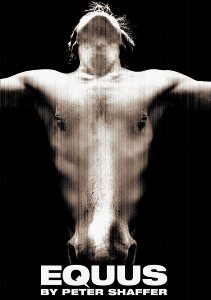 Earlier in the year, I reported on the Equus
publicity machine. The constant barrage of media stories
set up enormous expectations. I can only hope that they didn't prejudice me too
much. It's not that I didn't like the evening; I did. It just wasn't as good as the
original in one very vital aspect. The original production conjured a sense of the
holy on stage which Thea Sharrock's direction didn't really ever manage. John Napier
took on the design again which may have been a mistake as he may have felt compelled
to do things differently. For example, I hated the red lights in the horses's eyes
in the climactic scene and I really missed the sound of the horses hooves on the
wooden floor - nobody seemed to remember that horses put the front of their hooves
down first and then the heel (hence the clip-clop sound).
Earlier in the year, I reported on the Equus
publicity machine. The constant barrage of media stories
set up enormous expectations. I can only hope that they didn't prejudice me too
much. It's not that I didn't like the evening; I did. It just wasn't as good as the
original in one very vital aspect. The original production conjured a sense of the
holy on stage which Thea Sharrock's direction didn't really ever manage. John Napier
took on the design again which may have been a mistake as he may have felt compelled
to do things differently. For example, I hated the red lights in the horses's eyes
in the climactic scene and I really missed the sound of the horses hooves on the
wooden floor - nobody seemed to remember that horses put the front of their hooves
down first and then the heel (hence the clip-clop sound).
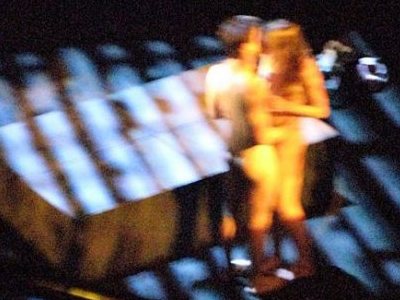
I'm not sure that I liked Richard Griffiths's take on the psychiatrist Martin Dysart.
Alec McCowen created a much more desicated individual, much more likely to be
rocked back on his heals by his patient's passionate religious creation. Daniel
Radcliffe as Alan Strang was rather good. He stuck with a Hampshire like accent
rather than Peter Firth's drama school trained vowel sounds. He was believable
as a teenager - well he is one.
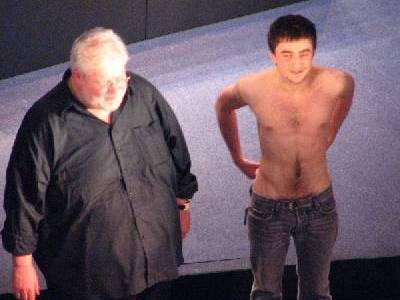
So you'll want to know what he's like in the buff. Well, he has a more than decent
body for a 17 year old - one that certainly betokens a personal trainer and much time
spent in the gym. But I was more impressed with the fact that he really can act
than the fact that he has a vigorous treasure trail.
![[Three Stars - Good]](3.gif)
We spent the Saturday morning in the Enlightenment Gallery of the British Museum
listening to an audio guide.
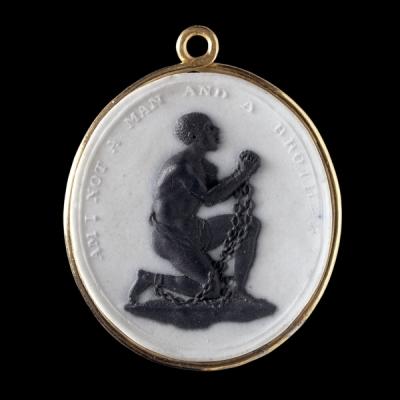
I think we made a mistake. It was good to see an example of Wedgwood's anti-slavery
medallion but I didn't find myself in thrall to much else. Just two stars on this
occasion, I feel.
![[Two Stars - Average]](2.gif)
And so to Euston. But no. Major engineering works prevented that. It was a case of
a taxi ride to Paddington. From there to Reading. Change there for a train that
went through Oxford and Birmingham before depositing us a Stafford. Thence to Lime
Street.
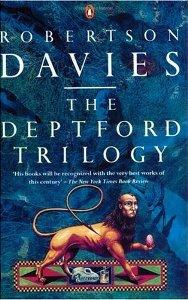 A long journey but it gave me the chance to finish off The Deptford Trilogy by
Robertson Davies. I've already read this author's
The Salterton Trilogy and
The Cornish Trilogy and have enjoyed them all.
The current volume had all of the delights of characterisation and plot and language
of the previous tomes as well as the faults of over-erudition and over-plotting and
over-emphasis. I'm sure that I shall return to and read all of these again sometime.
A long journey but it gave me the chance to finish off The Deptford Trilogy by
Robertson Davies. I've already read this author's
The Salterton Trilogy and
The Cornish Trilogy and have enjoyed them all.
The current volume had all of the delights of characterisation and plot and language
of the previous tomes as well as the faults of over-erudition and over-plotting and
over-emphasis. I'm sure that I shall return to and read all of these again sometime.
![[Three Stars - Good]](3.gif)
 In the event, I was not all that taken with the Death in Venice. Tom Pye's
design with Jean Kalman's lighting was visually very beautiful and Deborah Warner's
direction was very serious. But I think that their creation was completely wrong in
two vital respects. Firstly, it took a strong line that the piece is about the
difficulties of being continually creative and not at all about homoeroticism. That
may be true of Thomas Mann's novella but Britten's work, whether he liked it or not,
is built on the premise of an older man's infatuation with a beautiful young boy.
In the event, I was not all that taken with the Death in Venice. Tom Pye's
design with Jean Kalman's lighting was visually very beautiful and Deborah Warner's
direction was very serious. But I think that their creation was completely wrong in
two vital respects. Firstly, it took a strong line that the piece is about the
difficulties of being continually creative and not at all about homoeroticism. That
may be true of Thomas Mann's novella but Britten's work, whether he liked it or not,
is built on the premise of an older man's infatuation with a beautiful young boy.
 And that brings me to the second problem - Ian Bostridge's assumption of the title
rôle of Gustav von Aschenbach. He is simply too young. Superbly acted though
the physical descent into death by cholera is; superbly sung though the acres of
exalted recitative are; superbly characterised though the whole performance is, there
is no disguising the fact that Ian Bostridge is a man in early middle age enacting
the torments of a man in late middle age and he lacks the gravitas to carry the
project off.
And that brings me to the second problem - Ian Bostridge's assumption of the title
rôle of Gustav von Aschenbach. He is simply too young. Superbly acted though
the physical descent into death by cholera is; superbly sung though the acres of
exalted recitative are; superbly characterised though the whole performance is, there
is no disguising the fact that Ian Bostridge is a man in early middle age enacting
the torments of a man in late middle age and he lacks the gravitas to carry the
project off.
 We encountered one of the statues on Waterloo Bridge. We knew from advance publicity that
this was part of the exhibition and belonged to a work called Event Horizon which
placed statues on top of buildings within sight of the Hayward. To us, it felt like a
renegade from Another Place.
We encountered one of the statues on Waterloo Bridge. We knew from advance publicity that
this was part of the exhibition and belonged to a work called Event Horizon which
placed statues on top of buildings within sight of the Hayward. To us, it felt like a
renegade from Another Place.
 The show is called Blind Light and the centre piece is an installation filled with
vapour so that you cannot see more than six inches in front of you. It was a strange
experience living in a total white out in a gallery in London. After a while I got
used to working out where I was by creating splashing sounds in the water on the floor.
It was a bit like being a bat. The vapour did wonders for my sinuses as well.
The show is called Blind Light and the centre piece is an installation filled with
vapour so that you cannot see more than six inches in front of you. It was a strange
experience living in a total white out in a gallery in London. After a while I got
used to working out where I was by creating splashing sounds in the water on the floor.
It was a bit like being a bat. The vapour did wonders for my sinuses as well.
 The whole show was full of simple visual joy such as this. For example, I also liked
Allotment which comprises a room full of what appear at first sight to be serried
ranks of concrete boxes. It turns out that these are all individual and have been derived
from the shape, size and weight of a groups of villagers. In time, the room becomes
a crown of people. I walked among them and got to know them.
The whole show was full of simple visual joy such as this. For example, I also liked
Allotment which comprises a room full of what appear at first sight to be serried
ranks of concrete boxes. It turns out that these are all individual and have been derived
from the shape, size and weight of a groups of villagers. In time, the room becomes
a crown of people. I walked among them and got to know them.
 Elsewhere in the gallery were groups of strange extruded shapes which had in their kernel
a human form that was then extruded into great star bursts of wire. Elsewhere in the
gallery were rooms with human shapes sitting in each of the eight corners legs splayed
and arms raised so that their limbs follows the creases of the room. Then there was
Event Horizon best seen from the terraces of the Hayward Gallery. Where the
figures in Another Place are all looking away and out to see; all of the figures
here are looking back and at the gallery.
Elsewhere in the gallery were groups of strange extruded shapes which had in their kernel
a human form that was then extruded into great star bursts of wire. Elsewhere in the
gallery were rooms with human shapes sitting in each of the eight corners legs splayed
and arms raised so that their limbs follows the creases of the room. Then there was
Event Horizon best seen from the terraces of the Hayward Gallery. Where the
figures in Another Place are all looking away and out to see; all of the figures
here are looking back and at the gallery.




 A long journey but it gave me the chance to finish off The Deptford Trilogy by
Robertson Davies. I've already read this author's
A long journey but it gave me the chance to finish off The Deptford Trilogy by
Robertson Davies. I've already read this author's